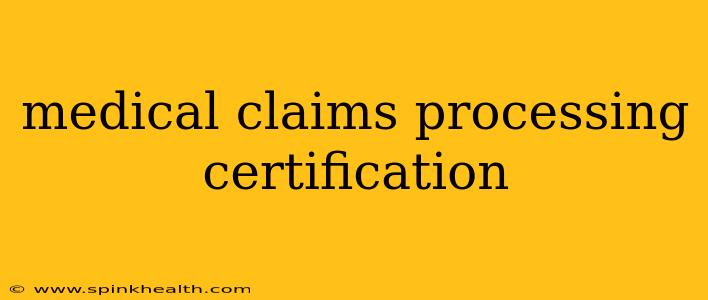The world of healthcare is complex, and accurate medical claims processing is its lifeblood. Ensuring providers get paid, patients receive the right care, and insurance companies maintain financial stability all hinge on this crucial process. If you're intrigued by the meticulous detail and vital role of medical claims processing, then pursuing a certification is a smart career move. But the path isn't always clear. This guide will illuminate the process, answering your burning questions and equipping you with the knowledge to make an informed decision.
Imagine this: You're meticulously reviewing a medical claim, ensuring every code, procedure, and diagnosis aligns perfectly. A single error could delay payment, frustrate a provider, or even impact patient care. This is the reality of medical claims processing, a field demanding precision, attention to detail, and a deep understanding of medical billing and coding. Certification demonstrates your mastery of these skills, setting you apart in a competitive job market.
What are the Different Types of Medical Claims Processing Certifications?
There's no single, universally recognized "Medical Claims Processing Certification." Instead, several organizations offer certifications focusing on specific areas within medical billing and coding. These vary in scope and depth, catering to different experience levels and career aspirations. Some popular certifications focus on:
- Certified Professional Coder (CPC): This is arguably the most well-known certification, offered by the American Academy of Professional Coders (AAPC). It focuses on medical coding using the ICD and CPT coding systems.
- Certified Billing and Coding Specialist (CBCS): This certification, also offered by the AAPC, combines coding and billing expertise.
- Certified Inpatient Coder (CIC): This AAPC certification specializes in inpatient coding.
- Other Specialized Certifications: Numerous organizations offer certifications focusing on specific areas like specialty coding (e.g., oncology, cardiology), electronic health records (EHR), or revenue cycle management.
The best certification for you will depend on your current skills, career goals, and the specific area within medical claims processing you wish to specialize in.
How Much Does Medical Claims Processing Certification Cost?
The cost of certification varies depending on the organization and the specific certification you pursue. Expect to pay a few hundred dollars for application fees, exam fees, and study materials. Some organizations offer payment plans or scholarships. Research the cost thoroughly before committing to a specific program.
What is the Average Salary for a Medical Claims Processor with Certification?
A certification significantly boosts your earning potential. The average salary for a medical claims processor with certification is typically higher than for those without. The exact figures depend on your location, experience, and the specific type of certification you hold. However, a certification can open doors to higher-paying positions and more career advancement opportunities.
How Long Does it Take to Become Certified in Medical Claims Processing?
The time commitment required varies considerably. Some certifications can be achieved within a few months of dedicated study, while others may require a longer timeframe, especially if you need to build a foundation of knowledge first. Consider your current skill level and the complexity of the certification program when estimating the timeframe.
What Are the Job Outlook and Career Advancement Opportunities?
The job outlook for certified medical claims processors is generally positive, driven by the ongoing growth of the healthcare industry and the increasing demand for efficient and accurate billing practices. Certification significantly improves your career prospects, opening doors to leadership roles, management positions, or specialized coding niches.
Is Online Medical Claims Processing Certification a Viable Option?
Many reputable organizations now offer online medical claims processing certifications, providing flexibility and convenience. These programs often mirror in-person courses in terms of curriculum and assessment, ensuring you receive a quality education regardless of your learning preference.
In conclusion, pursuing medical claims processing certification is a worthwhile investment in your professional future. By carefully researching different programs and choosing a certification that aligns with your goals, you'll equip yourself with the skills and credentials needed to thrive in this essential healthcare field. Remember, the meticulous work you perform contributes directly to the smooth functioning of the healthcare system, and your expertise is highly valued.

